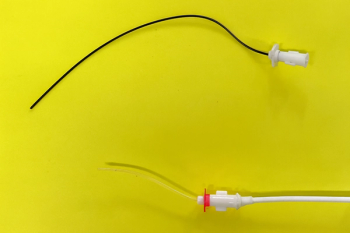
Practical Matters: Urine cortisol:creatinine ratio-the most useful normal test around
Definitively diagnosing canine hyperadrenocorticism (Cushing's disease) can be exceptionally difficult because nonadrenal illness can affect the test results. However, I think that the urine cortisol:creatinine ratio (UC:Cr) serves an invaluable role in ruling out canine Cushing's disease since a dog with a normal UC:Cr almost assuredly does not have Cushing's disease.
Definitively diagnosing canine hyperadrenocorticism (Cushing's disease) can be exceptionally difficult because nonadrenal illness can affect the test results. However, I think that the urine cortisol:creatinine ratio (UC:Cr) serves an invaluable role in ruling out canine Cushing's disease since a dog with a normal UC:Cr almost assuredly does not have Cushing's disease.
Dogs with hypercortisolemia have increased excretion of cortisol in their urine. This excretion can be compared to creatinine excretion, which should be fairly constant in dogs with normal renal function. False-positive elevation of the UC:Cr (i.e. elevation not related to Cushing's disease) can occur in patients with gastrointestinal, renal, lower urinary tract, liver, neurologic, or immune-mediated diseases or congestive heart failure.1 Although the UC:Cr is more frequently elevated than it is normal, when it is normal, you know that your patient does not have Cushing's disease and that you need to look for another possible cause for the patient's clinical signs.
It is preferable to perform a UC:Cr on a free-catch sample collected at home in the morning because a patient's stress from visiting the hospital or undergoing a cystocentesis can alter the UC:Cr.2 With this in mind, I will typically have my clients wait a few days after our appointment to collect the sample for submission.
With the recent changes in availability and pricing of synthetic corticotropin (cosyntropin), which is used in the ACTH response test, keep in mind that the UC:Cr also can be used as a monitoring tool. Although several studies have documented that it is not ideal to use the UC:Cr as a monitoring tool during the loading phase of mitotane treatment, it can be used safely during the maintenance phase because of the low risk of hypoadrenocorticism occurring compared with the risk during the loading phase. The problem with using the UC:Cr to monitor patients during the loading phase is its inability to differentiate between well-controlled and overdosed patients. This distinction is important as well-controlled patients would be switched to maintenance treatment but overdosed patients would require close monitoring and potential treatment for hypoadrenocorticism.
A diagnosis of Cushing's disease depends on a conglomeration of clinical acumen, biochemical abnormalities, and the results of provocative testing and of a physical examination. The process of confirming the diagnosis can be costly. Performing a UC:Cr early in the protocol can save clients money and provide you with an excellent diagnostic tool.
REFERENCES
1. Smiley LE, Peterson ME. Evaluation of a urine cortisol:creatinine ratio as a screening test for hyperadrenocorticism in dogs. J Vet Intern Med 1993;7:163-168.
2. Van Vonderen IK, Kooistra HS, Rijnberk A. Influence of veterinary care on the urinary corticoid:creatinine ratio in dogs. J Vet Intern Med 1998;12:431-435.
Nyssa J. Reine, DVM, DACVIM
(small animal internal medicine)
Department of Medicine
The Animal Medical Center
510 E. 62nd St.
New York, NY 10021
Nyssa J. Reine, DVM, DACVIM (small animal internal medicine)
Newsletter
From exam room tips to practice management insights, get trusted veterinary news delivered straight to your inbox—subscribe to dvm360.



